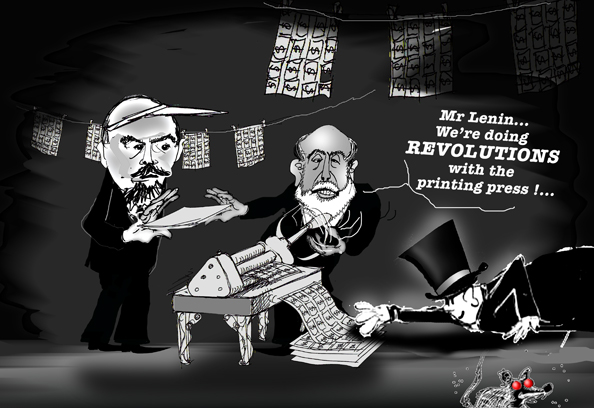Search
Recent comments
- "benevolence"....
6 hours 23 min ago - trump's BoP is worse....
14 hours 47 min ago - luce's....
16 hours 48 min ago - dystopian....
1 day 2 hours ago - the fascists....
1 day 3 hours ago - not peaceful....
1 day 5 hours ago - 25 big helpers....
1 day 5 hours ago - courage....
1 day 6 hours ago - going nuts....
1 day 6 hours ago - oily law....
1 day 7 hours ago
Democracy Links
Member's Off-site Blogs
parallels...

In the space of a mere eight years, the former US Federal Reserve Bank Chair Ben Bernanke has managed to achieve what Lenin could barely conceive. He's convinced the US, the UK, Japan and Europe to embark on a revolutionary journey to completely subvert free market instincts, writes Ian Verrender.
Maybe it's just me, but have you noticed the striking similarity between Vladimir Lenin and Ben Bernanke lately?
Superficially, there's the obvious physical resemblance; whippet build, glabrous pate, facial hair and a penchant for stylish, if somewhat conservative, garb.
More significantly, both appear to harbour the same ideological distrust of free markets or, at the very least, a burning desire to control them as much as possible.
Separated by almost a century, both men have made it a lifelong ambition to impose state control over the economy.
And it has to be said, while Vladimir Ilyich Ulyanov Lenin achieved significant success in spreading the word from Russia through developing nations, he and his successors never quite got across the line when it came to the so-called free world.
Maybe it was his reputation as a firebrand, an over-reliance on bloody revolution by force and the frightening prospect - for the ruling elite at least - that wealth would be redistributed to the poor.
...
For the past five years, however, as markets have shot to new records, the global economy has continued to slow. And central bankers, having driven this boom, now find themselves fearful of taking any action that may undermine it. They can no longer control the monster they've created and now are fearful of incurring its wrath.
It began as an attempt to pour money into the economy and artificially depress interest rates, to spark business investment, encourage employment and consumer spending. Instead, it fed directly into speculative investment. And those who profited the most are those that stoked the fires of the Financial Crisis. Late last week, JP Morgan Chase delivered a $US6.2 billion profit for the June quarter.
Three weeks ago, the UK decision to leave the European Union sent markets into a savage tailspin. Within hours, the Bank of England, the European Central Bank among others were promising even more "stimulus".
The amounts of money involved are staggering.
A few months ago, Japan earmarked $US851 billion for stimulus for this year alone. And the US Federal Reserve has bought more than $US4.2 trillion of its own securities in recent years under the guise of quantitative easing.
Even investment banks, having ridden this artificial boom for seven years, have grown wary of the overbearing influence the state on financial markets.
Take this note from Macquarie to clients last week, reprinted by blogsite Macrobusiness:
We believe that the global economy and investors are residing in the twilight zone between an era of relatively free market capitalist economies (with its own set of signals) and a new environment which is likely to be completely dominated by the state.
Who knows where this all will end? Many are concerned that all this Central Bank intervention not only has prolonged the inevitable, but created an environment for a much greater collapse.
Others are starting to think that it all may never end; that we've discovered the elixir of permanent wealth; that given governments have bought all their own debt, they'll just forgive themselves or extend the payment date into the never never.
But even Lenin realised there were limits to revolutionary activity.
Ian Verrender is the ABC's business editor.
http://www.abc.net.au/news/2016-07-18/verrender-goodbye-lenin,-hello-bernanke/7637378
- By Gus Leonisky at 18 Jul 2016 - 6:35pm
- Gus Leonisky's blog
- Login or register to post comments
the price of chips...
SoftBank agreed on Monday to acquire ARM Holdings, the British semiconductor designer, for $32 billion, in a deal that would give the Japanese company a big business designing chips for mobile phones and a growing array of smart, interconnected gadgets.
The deal represents the first large-scale, cross-border transaction in Britain since it voted to exit the European Union last month. ARM had been seen as a haven from the volatility surrounding that split — known as Brexit — because its chip technology is used in mobile phones all over the world, with limited revenue derived from Britain.
ARM Holdings may not be a household name, but it is likely that one of the company’s chip designs powers your smartphone, tablet or other mobile device. It designs chips and parts of chips that use less power so that they can be used in smaller gadgets. ARM had a market capitalization of about $22 billion as of Friday’s close, and the proposed acquisition represents a 43 percent premium on the company’s closing share price last week.
read more:
http://www.nytimes.com/2016/07/19/business/dealbook/softbank-buys-chip-designer-arm.html?ref=business&_r=0